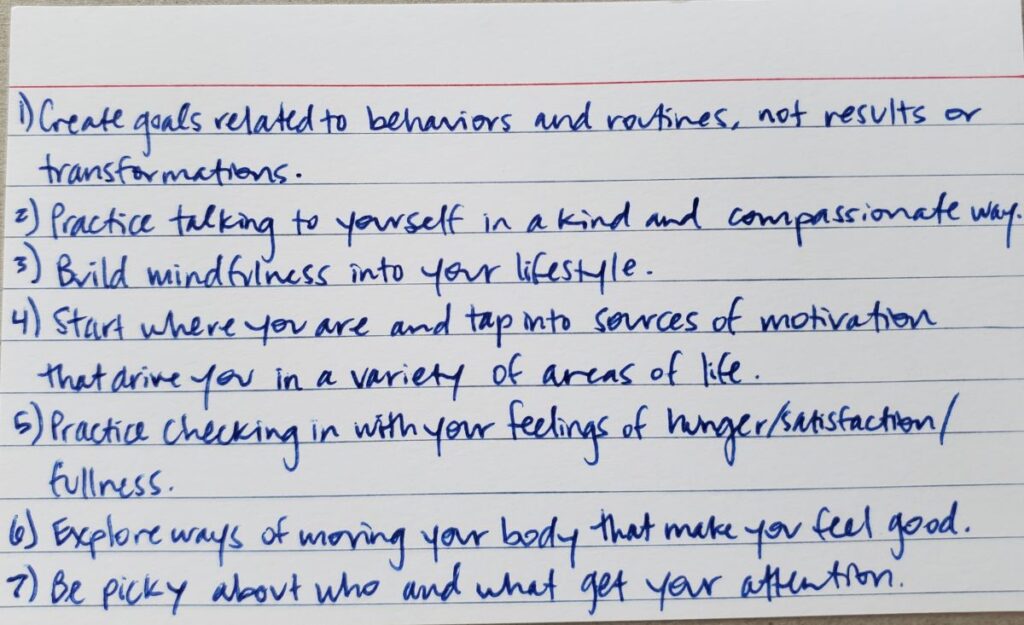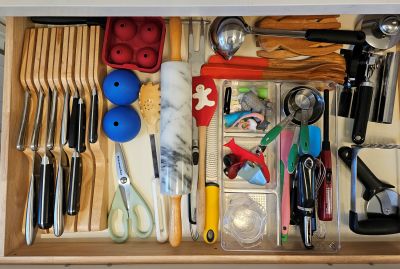This is the first post in a series of 4 in which I highlight recommendations I offer health coaching participants on a regular basis as they improve their health and wellness without dieting. I started writing this with the goal of being able to describe these so briefly that they would fit on an index card and the posts that follow include elaboration on these 7 principles. If you’re interested in knowing more about health behavior change or health coaching, I encourage you to check out what I’ve written on those topics. Here are links to Part 2, Part 3, and Part 4.
As a registered dietitian health coach, I often hear about fad diets and unhelpful approaches to changing habits. While some people might find what they’re looking for by trying those, the participants I work with generally find that they haven’t helped them establish sustainable habits so it’s not where I encourage them to focus their time and energy. A quick fix not only isn’t likely to lead to long-term lifestyle change; it also could have negative impacts to mental, emotional and physical health. Instead, I provide guidance and support to participants as they learn from their current habits and identify where and how they might be able to do things differently while progressing toward their health goals.
The process I help to facilitate is called health behavior change, and in this post I’m sharing some of the key guidelines I recommend when working as a health coach. This isn’t a comprehensive list and I always work with participants to individualize their approach, but it’s a summary or ‘greatest hits’ list to give you an idea of what people often find helpful as they engage in this process.
In an effort to briefly state my top 7 tips for improving wellness without dieting, I wrote them on this index card:

I write extensively about these tips in this series of posts, and this first one offers a quick overview:
1) Create goals that are behavior-based instead of focusing on results or transformations.
Learn to observe the habits you engage in throughout your typical day and create goals that connect with your long-term health and wellness and set you up to change your habits accordingly.
2) Practice talking to yourself in a kind and compassionate way.
Notice your inner monologue, or self-talk, and practice keeping it helpful, gentle, solutions-oriented.
3) Find ways to build mindfulness into your lifestyle.
There are 5 primary ways that mindfulness contributes to health behavior change and striving for a healthier lifestyle:
- Managing stress
- Observing without judgment
- Noticing patterns and identifying opportunities for making small adjustments
- Building resilience
- Maintaining new habits
4) When making goals and plans start with your current routines and tap into the sources of motivation that drive you in all areas of life.
Identify what’s driving you to make a change. Ideally these sources of motivation connect with deep personal values that are likely to remain true throughout your life, even when you’re discouraged. Set yourself up to experiment with making small changes to your current routine and gradually develop new habits while working toward larger goals. Keep your expectations realistic within the constraints of your responsibilities, your preferences, and what’s sustainable for you.
5) Practice checking in with your feelings of hunger/satisfaction/fullness and let those guide eating choices.
Making changes to eating habits can potentially lead to health improvement, but only if those changes include recognizing and responding to your hunger and fullness feelings. Practice including the foods you enjoy in your diet with hunger/satisfaction/fullness feelings guiding you rather than rules or restrictions.
6) Explore ways of moving your body which make you feel good.
Whether it’s cardiovascular, strength training, building flexibility or stability, exercise contributes to health in many ways. Instead of believing your activity routine must match a certain standard or guideline, consider what works best for you given your time available, preferences and ability. If your goal is to do more activity, start with a small change to your routine and get consistent with that before building more into your routine.
7) Be picky about what and who gets your attention.
Distraction is everywhere. If you find that you’re getting distracted and it’s leading to not making progress toward your goals, consider ways that you might be able to edit the places where your attention goes.
Summary/Final thoughts
It’s possible to improve wellness and health without dieting, and if you’re interested in working with a coach who can support you while you make changes I encourage you to look for a credentialed and experienced professional. These concepts described here related to improving wellness without dieting should be considered helpful tips for educational purposes rather than individualized recommendations.
READY TO GET STARTED?
Book A Free Discovery Call
Are you ready to stress less while you make progress toward your health goals with evidence-based strategies and support from a coach? Book a discovery call today and let’s see if we’re a match to work together.
To check out the next post in this series, click here!







0 Comments